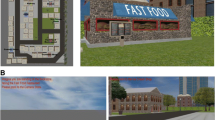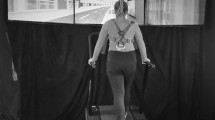Abstract
In everyday life, navigators often consult a map before they navigate to a destination (e.g., a hotel, a room, etc.). However, not much is known about how humans gain spatial knowledge from seeing a map and direct navigation together. In the present experiments, participants learned a simple multiple corridor space either from a map only, only from walking through the virtual environment, first from the map and then from navigation, or first from navigation and then from the map. Afterwards, they conducted a pointing task from multiple body orientations to infer the underlying reference frames. We constructed the learning experiences in a way such that map-only learning and navigation-only learning triggered spatial memory organized along different reference frame orientations. When learning from maps before and during navigation, participants employed a map- rather than a navigation-based reference frame in the subsequent pointing task. Consequently, maps caused the employment of a map-oriented reference frame found in memory for highly familiar urban environments ruling out explanations from environmental structure or north preference. When learning from navigation first and then from the map, the pattern of results reversed and participants employed a navigation-based reference frame. The priority of learning order suggests that despite considerable difference between map and navigation learning participants did not use the more salient or in general more useful information, but relied on the reference frame established first.


Similar content being viewed by others
References
Borella, E., Meneghetti, C., Muffato, V., & De Beni, R. (2014). Map learning and the alignment effect in young and older adults: how do they gain from having a map available while performing pointing tasks? Psychological Research, 1–16.
Carrubba, S., Frilot, C, I. I., Chesson, A. L, Jr, & Marino, A. A. (2007). Evidence of a nonlinear human magnetic sense. Neuroscience, 144(1), 356–367.
Frankenstein, J., Mohler, B. J., Bülthoff, H. H., & Meilinger, T. (2012). Is the map in our head oriented north? Psychological Science, 23(2), 120–125. doi:10.1177/0956797611429467.
Hinzman, D. L., O’Dell, C. S., & Arndt, D. R. (1981). Orientation in cognitive maps. Cognitive Psychology, 13, 149–206.
Iachini, T., Ruotolo, F., & Ruggiero, G. (2009). The effects of familiarity and gender on spatial representation. Journal of Environmental Psychology, 29(2), 227–234. doi:10.1016/j.jenvp.2008.07.001.
Kelly, J. W., & McNamara, T. P. (2010). Reference frames during the acquisition and development of spatial memories. Cognition, 116(3), 409–420. doi:10.1016/j.cognition.2010.06.002.
Latini-Corazzini, L., Nesa, M. P., Ceccaldi, M., Guedj, E., Thinus-Blanc, C., Cauda, F., & Peruch, P. (2010). Route and survey processing of topographical memory during navigation. Psychological Research, 74(6), 545–559. doi:10.1007/s00426-010-0276-5.
Lloyd, R. (1989). Cognitive maps—encoding and decoding information. Annals of the Association of American Geographers, 79(1), 101–124.
Marchette, S. A., Yerramsetti, A., Burns, T. J., & Shelton, A. L. (2011). Spatial memory in the real world: long-term representations of everyday environments. Memory & Cognition, 39(8), 1401–1408. doi:10.3758/s13421-011-0108-x.
McNamara, T. P., Rump, B., & Werner, S. (2003). Egocentric and geocentric frames of reference in memory of large-scale space. Psychonomic Bulletin & Review, 10, 589–595.
McNamara, T. P., Sluzenski, J., & Rump, B. (2008). Human spatial memory and navigation. In H. L. Roediger (Ed.), Cognitive psychology of memory. Learning and memory: A comprehensive reference (vol. 2, pp. 157–178). Oxford: Elsevier.
Meilinger, T., Frankenstein, J., & Bülthoff, H. H. (2013). Learning to navigate: experience versus maps. Cognition, 129(1), 24–30. doi:10.1016/j.cognition.2013.05.013.
Meilinger, T., Riecke, B. E., & Bülthoff, H. H. (2014). Local and global reference frames for environmental spaces. Quarterly Journal of Experimental Psychology, 67, 542–569. doi:10.1080/17470218.2013.821145.
Moeser, S. D. (1988). Cognitive mapping in a complex building. Environment and Behavior, 20(1), 21–49.
Piaget, J., & Inhelder, B. (1969). The psychology of the child. New York: Basic Books.
Richardson, A. E., Montello, D. R., & Hegarty, M. (1999). Spatial knowledge acquisition from maps and from navigation in real and virtual environments. Memory & Cognition, 27(4), 741–750.
Rossano, M. J., West, S. O., Robertson, T. J., Wayne, M. C., & Chase, R. B. (1999). The acquisition of route and survey knowledge from computer models. Journal of Environmental Psychology, 19(2), 101–115.
Shelton, A. L., & McNamara, T. P. (2001). Systems of spatial reference in human memory. Cognitive Psychology, 43(4), 274–310. doi:10.1006/cogp.2001.0758.
Shelton, A. L., & McNamara, T. P. (2004). Orientation and perspective dependence in route and survey learning. Journal of Experimental Psychology. Learning, Memory, and Cognition, 30(1), 158–170. doi:10.1037/0278-7393.30.1.158.
Sholl, M. J. (1987). Cognitive maps as orienting schemata. Journal of Experimental Psychology. Learning, Memory, and Cognition, 13, 615–628.
Snijders, T., & Bosker, R. (1999). Multilevel analysis. Thousand Oaks: Sage.
Sun, H.-J., Chan, G. S. W., & Campos, J. L. (2004). Active navigation and orientation-free spatial representations. Memory & Cognition, 32(1), 51–71.
Taylor, H. A., Naylor, S. J., & Chechile, N. A. (1999). Goal-specific influences on the representation of spatial perspective. Memory & Cognition, 27(2), 309–319.
Thorndyke, P. W., & Hayes-Roth, B. (1982). Differences in spatial knowledge acquired from maps and navigation. Cognitive Psychology, 14, 560–589.
Tlauka, M., Carter, P., Mahlberg, T., & Wilson, P. N. (2011). The first-perspective alignment effect: the role of environmental complexity and familiarity with surroundings. The Quarterly Journal of Experimental Psychology, 64, 2236–2250. doi:10.1080/17470218.2011.586710.
Tlauka, M., & Nairn, M. J. (2004). Encoding of multiple map orientations. Spatial Cognition & Computation, 4(4), 359–372. doi:10.1207/s15427633scc0404_4.
Werner, S., & Schmidt, K. (1999). Environmental reference systems for large-scale spaces. Spatial Cognition and Computation, 1, 447–473.
Wilson, P. N., Wilson, Da, Griffiths, L., & Fox, S. (2007). First-perspective spatial alignment effects from real-world exploration. Memory & Cognition, 35(6), 1432–1444.
Acknowledgments
This work was supported by the DFG grants ME 3476/2-2 and in the SFB/TR8 Spatial Cognition project I6-NavTalk, by the Japanese Society for the Promotion of Science, Japan KAKENHI grant (23240034), the Humboldt Foundation, and by the Brain Korea 21 PLUS Program through the National Research Foundation of Korea funded by the Ministry of Education. We would like to thank Chantal Horeis and Nikola Bubalo for their help in data collection and analysis.
Author information
Authors and Affiliations
Corresponding authors
Rights and permissions
About this article
Cite this article
Meilinger, T., Frankenstein, J., Watanabe, K. et al. Reference frames in learning from maps and navigation. Psychological Research 79, 1000–1008 (2015). https://doi.org/10.1007/s00426-014-0629-6
Received:
Accepted:
Published:
Issue Date:
DOI: https://doi.org/10.1007/s00426-014-0629-6




